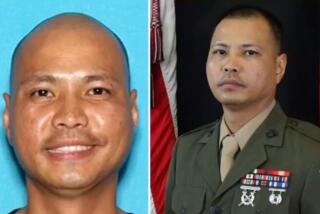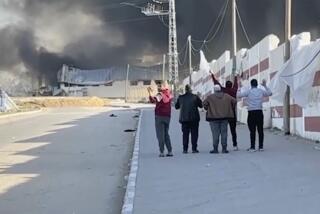Shooting Spurs Iraqi Uproar, U.S. Inquiry
- Share via
BAGHDAD — Television images of a Marine fatally shooting an unarmed, wounded insurgent in a Fallouja mosque were repeatedly broadcast on Arab television Tuesday, enraging Iraqis and prompting calls from human rights groups for a broad investigation into U.S. conduct during the war.
The footage shows the Marine screaming that the insurgent is faking death. He then raises his rifle and fires into the insurgent’s head at point-blank range.
For the record:
12:00 a.m. Nov. 19, 2004 For The Record
Los Angeles Times Friday November 19, 2004 Home Edition Main News Part A Page 2 National Desk 1 inches; 43 words Type of Material: Correction
Iraq shooting -- Two images on Wednesday’s Page A1 that were taken from video footage of a U.S. Marine shooting an apparently unarmed, wounded Iraqi fighter in a Fallouja mosque and then walking away were incorrectly credited to Reuters. The source was NBC.
“Well, he’s dead now,” another Marine says.
For many Iraqis, the shooting evoked the same sentiments as the Abu Ghraib prison abuse photos, which showed U.S. troops torturing Iraqi prisoners, forcing them to simulate sexual acts and otherwise humiliating them.
Some Iraqis called the killing an example of U.S. war crimes that routinely go unreported.
“If they are capable of doing this in front of the camera, then imagine what they have done behind it,” said Niran Mohammed, 53, who was visiting a Baghdad ice cream shop with her children Tuesday night.
“It goes to show that [Marines] are not any better than the so-called terrorists. Their true intentions are getting clearer by the day,” she added.
The Marine suspected of shooting the unarmed militant has been removed from his unit pending an investigation, U.S. officials said. The military declined to identify him.
Military legal experts said mitigating circumstances might have been a factor in the incident.
A Marine spokesman said the Marine in the video had been shot in the face the previous day but had returned to the battle, and a friend of his had been killed by a booby-trapped corpse.
“Tapes and pictures can be misleading. They can depict events in a false light,” said Eugene R. Fidell, president of the National Institute of Military Justice and a partner in a Washington law firm that specializes in defending military personnel.
Chuck Blanchard, a former Army general counsel, said the military would consider the dangerous nature of the combat in Fallouja.
But he added, “If they believe it was a violation of what every Marine is told about how to treat prisoners on the battlefield, they’re going to be very harsh on this Marine.”
The shooting was videotaped Saturday by an NBC television crew traveling with the Marines’ 3rd Battalion, 1st Regiment, which was among the many battalions trying to recapture the rebel-held city.
NBC correspondent Kevin Sites reported that a different Marine unit had stormed the mosque Friday, killing 10 insurgents and wounding five. The unit treated the wounded men before moving on.
Some reports said that four of the five wounded men may have been shot again Saturday by members of the squad that he accompanied.
In an account on NBC’s website, Sites said a Marine noticed that one of the wounded men was still breathing. On the videotape, the Marine could be heard using an expletive as he said: “He’s ... faking he’s dead -- he’s faking he’s ... dead.”
The Marine then fired the fatal shot.
Sites said that when he told the Marine that the man he shot was a wounded prisoner, the Marine responded: “I didn’t know, sir. I didn’t know.”
The U.S. military promised a thorough investigation.
“We follow the Law of Armed Conflict and hold ourselves to a high standard of accountability,” Lt. Gen. John F. Sattler, commander of the 1st Marine Expeditionary Force, said in a statement. “The facts of this case will be thoroughly pursued to make an informed decision and to protect the rights of all persons involved.”
Human rights groups called on the military to expand its inquiry to cover more broadly how it has conducted the war in Iraq.
Amnesty International urged the military to investigate an earlier incident, reported recently by Britain’s Independent Television News, in which an American serviceman appeared to have fired at a wounded insurgent who was off-screen, and then said, “He’s gone.”
“We’re very concerned about what the footage apparently depicts,” said Alistair Hodgett, an Amnesty spokesman. “The laws of war are very clear that wounded and unarmed fighters cannot be shot. If indeed this was a deliberate shooting of a fighter who posed no threat, it would qualify as a war crime.”
Under the Geneva Convention and U.S. military law, a soldier who shoots an unarmed, wounded combatant can be found guilty of murder. But the soldier can argue that he had a “reasonable fear” that he was about to suffer death or grievous bodily harm, experts said.
But M. Cherif Bassiouni, professor of law at DePaul University in Chicago, said the video suggested an open-and-shut case.
“There is no indication that at the time this Marine saw that this injured person was armed or constituted a threat to the Marine or his unit, and as a result it is plain and simple murder under the Uniform Code of Military Justice,” said Bassiouni, who headed the United Nations commission investigating war crimes in the former Yugoslavia.
One analyst expressed concern that the shooting would further tarnish the United States’ image among Iraqis and other Arabs. News coverage of the shooting overshadowed the Marines’ assertion Tuesday that they were in control of Fallouja and needed to deal with only small pockets of resistance.
“Especially after Abu Ghraib, we don’t have a level of trust and credibility with many people inside the Arabic and Islamic world,” said Charles V. Pena, a military analyst with the libertarian Cato Institute. “This certainly doesn’t help us make our case with them.”
Hodgett, the Amnesty spokesman, faulted the Bush administration for not strictly adhering to Geneva Convention guidelines in its pursuit of extremists after the Sept. 11 terrorist attacks.
That attitude “filtered downward” through the ranks of the military and “sent a message that the United States was not going to be bound by the full letter and intent of these laws,” Hodgett said.
Historically, battlefield commanders have faced the difficult task of motivating troops to kill their adversaries while ensuring the lawful treatment of prisoners.
Before the Marines launched the assault on Fallouja, U.S. military leaders and Iraqi government officials used fiery language. The town was “being held hostage by mugs, thugs, murderers and intimidators,” Sattler, the Marine general, told troops at a base where several thousand were preparing for battle.
Interim Iraqi Prime Minister Iyad Allawi told his soldiers that “the people of Fallouja have been taken hostage, and you need to free them from [the insurgents’] grip.”
“May they go to hell!” the soldiers shouted.
Allawi replied: “To hell they will go.”
Hendren reported from Baghdad and Shogren from Washington. Staff writers Ashraf Khalil in Amman, Jordan, and Maggie Farley in New York and special correspondent Said Rifai in Baghdad contributed to this report.
More to Read
Sign up for Essential California
The most important California stories and recommendations in your inbox every morning.
You may occasionally receive promotional content from the Los Angeles Times.










